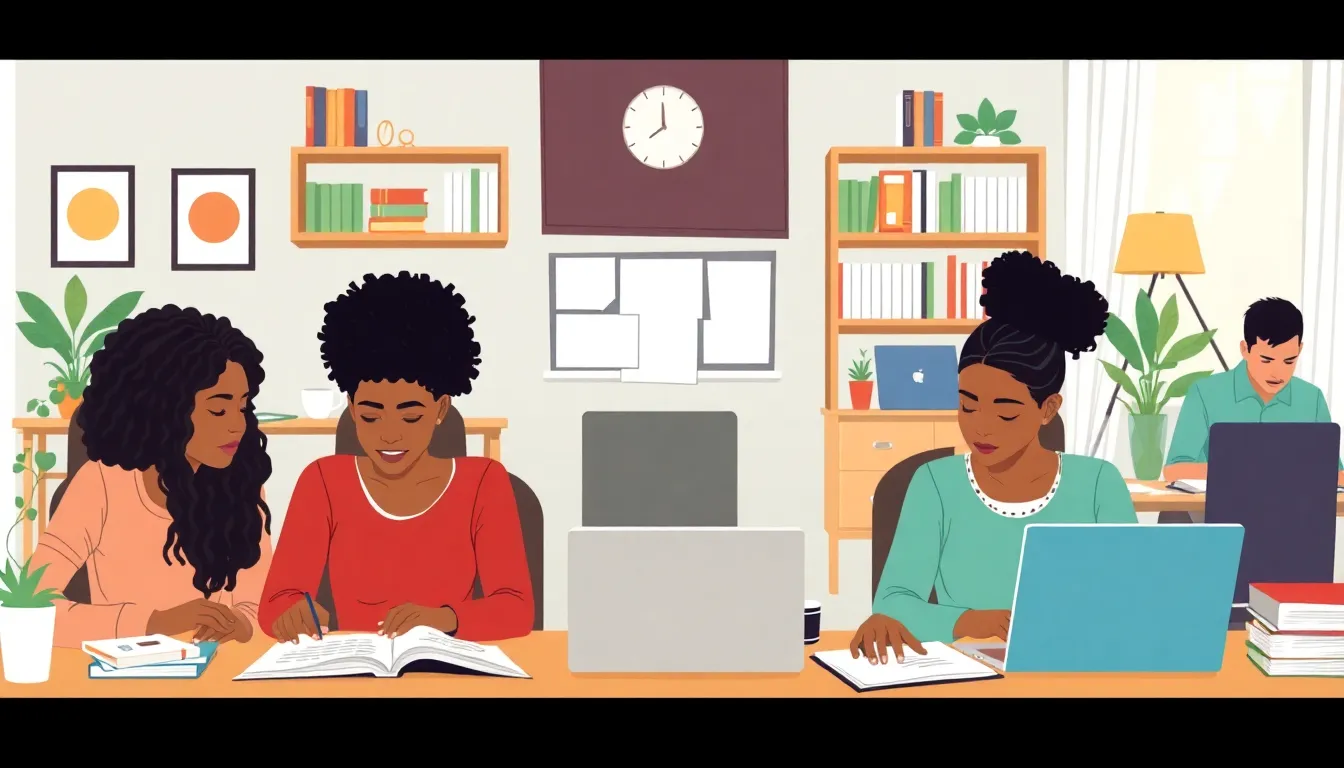In a world where emojis often replace words, mastering the art of reading and literacy might feel like an uphill battle. But what if there’s a way to turn that challenge into an opportunity? Pursuing a doctorate in reading and literacy online offers a unique chance to dive deep into the fascinating world of language and learning—all from the comfort of your couch, pajama pants optional.
Table of Contents
ToggleOverview of Doctorate in Reading and Literacy Online
An online doctorate in reading and literacy focuses on advanced study and research in literacy education. This program equips educators with strategies to enhance reading skills in diverse environments, addressing the evolving landscape of communication.
Students explore critical literacy theories and practices aimed at improving reading outcomes. Courses often include curriculum development, literacy assessment, and instructional leadership, providing a comprehensive understanding of contemporary literacy challenges.
Flexibility characterizes online learning, allowing students to balance their studies with professional responsibilities. Many institutions offer asynchronous course formats, enabling them to complete coursework at their own pace.
Research opportunities also play a vital role in the program. Candidates typically engage in original research projects that contribute to the field of literacy studies. These projects can focus on topics such as digital literacy, community literacy initiatives, or reading interventions for struggling learners.
Networking and collaboration enhance the experience. Doctoral students connect with faculty and peers from varied backgrounds, enriching discussions and expanding perspectives. This collaboration fosters an inclusive learning environment that encourages innovative approaches to literacy education.
Accredited programs ensure quality education and meet academic standards. Graduates from these programs may pursue roles in higher education, literacy coaching, curriculum design, or educational leadership. The pathway to a doctorate in reading and literacy online offers valuable skills and insights needed to tackle literacy challenges today.
Benefits of Pursuing a Doctorate Online


Pursuing a doctorate online in reading and literacy offers numerous advantages. Individuals can tailor their education to fit their unique schedules and professional commitments.
Flexibility and Convenience
Flexibility stands out as a significant benefit of online programs. Students can access coursework from any location, eliminating the need for commuting to a campus. Convenience plays a crucial role, as learners can study at their own pace and choose when to engage with course materials. Asynchronous formats allow for participation at times that suit individual routines, whether early in the morning or late at night. This adaptability makes the pursuit of an advanced degree manageable for working professionals.
Cost-Effectiveness
Cost-effectiveness often attracts students to online doctorate programs. Tuition rates for online courses generally remain lower than those for traditional classroom-based programs. Students can also save on commuting, housing, and associated costs of relocation. Financial aid options, like grants and scholarships, may be available specifically for online learners, further alleviating expenses. Graduates emerge with a quality education that prepares them for rewarding careers, ensuring that their investments yield substantial returns.
Program Structure and Curriculum
The program structure for a doctorate in reading and literacy online typically features core courses and elective options that provide a comprehensive educational experience. Courses designed for this curriculum focus on both theoretical knowledge and practical application.
Core Courses
Core courses form the backbone of the curriculum. Topics covered often include advanced literacy theories, curriculum design, and literacy assessment strategies. Additionally, coursework enables students to explore instructional leadership roles and effective teaching practices. Every course aims to develop critical thinking and research skills essential for addressing literacy issues within diverse settings. Students also engage in practical assignments that apply theories in real-world contexts, facilitating a deeper understanding of literacy education.
Elective Options
Elective options expand the educational experience, allowing students to tailor their learning to specific interests. Choices may include topics such as digital literacy, multicultural literacy, and reading interventions. Selecting electives fosters exploration of contemporary challenges in literacy education. Students can also choose courses that enhance their research skills or delve into specialized areas of practice. Offering flexibility, elective courses encourage deeper engagement with subjects relevant to each student’s career aspirations in education and literacy leadership.
Admission Requirements
Admission to an online doctorate in reading and literacy requires specific criteria. Programs typically prioritize candidates with a background in education or literacy-related fields.
Educational Background
Candidates often need a master’s degree in education, literacy, or a closely related discipline. Previous coursework in literacy theory, instructional strategies, or curriculum development strengthens applications. Many programs accept applicants with diverse educational experiences, including teaching certification or professional experience in literacy education. Knowledge of current literacy trends also enhances suitability for the program.
Application Process
The application process generally involves several essential steps. First, candidates submit a completed application form, alongside official transcripts from all postsecondary institutions attended. Next, recommendations from academic or professional references are crucial, as they provide insight into the candidate’s abilities. A personal statement outlining goals, research interests, and relevant experience adds depth to applications. Finally, some programs may require standardized test scores, such as the GRE, depending on their admission criteria.
Career Opportunities with a Doctorate in Reading and Literacy
A doctorate in reading and literacy opens diverse career paths focused on enhancing reading skills. Professionals in this field contribute to education through advanced research and practical applications.
Academia
Positions in academia thrive for those holding a doctorate. University faculty roles allow individuals to teach literacy courses and mentor students. Research opportunities abound as well; scholars can publish findings that influence literacy education. Many academic institutions seek educators who can develop curriculum and programs that address literacy challenges. Furthermore, roles such as program directors and department chairs often require advanced qualifications, making the doctorate highly valuable.
Educational Leadership
Doctorates in reading and literacy drive individuals into educational leadership positions. Administrators often shape literacy initiatives across school districts, implementing evidence-based strategies. They can oversee literacy programs, ensuring compliance with educational standards. Coaching roles also exist, where literacy coaches work directly with teachers to enhance instructional techniques. Additionally, advocacy opportunities arise, enabling professionals to influence policy and funding for literacy initiatives.



